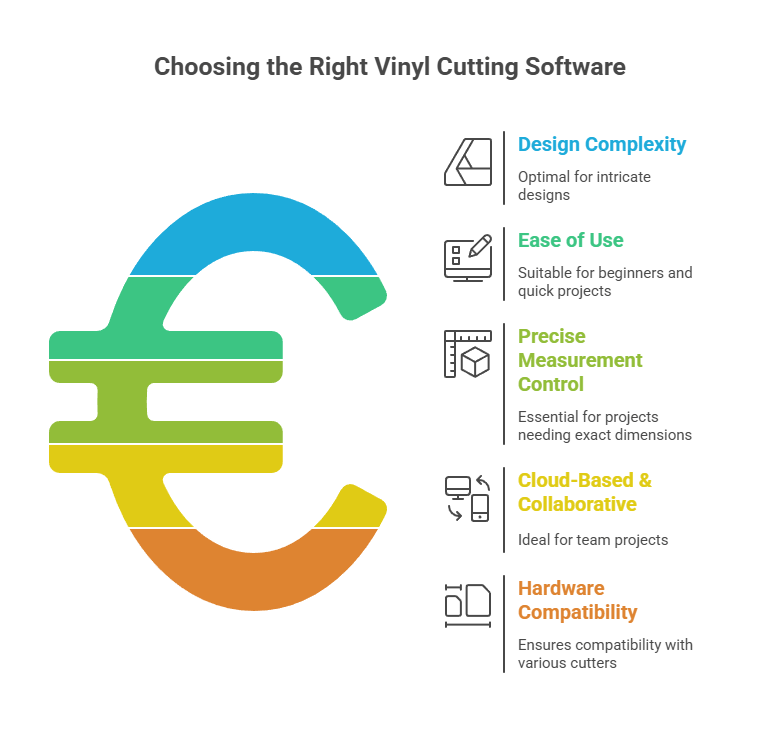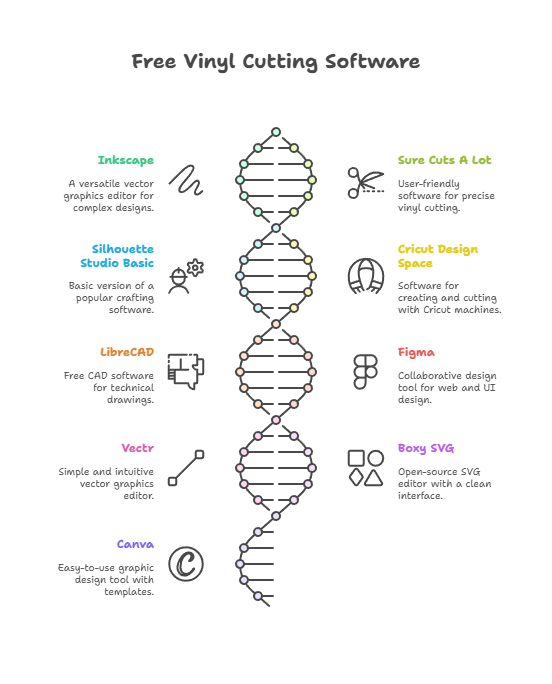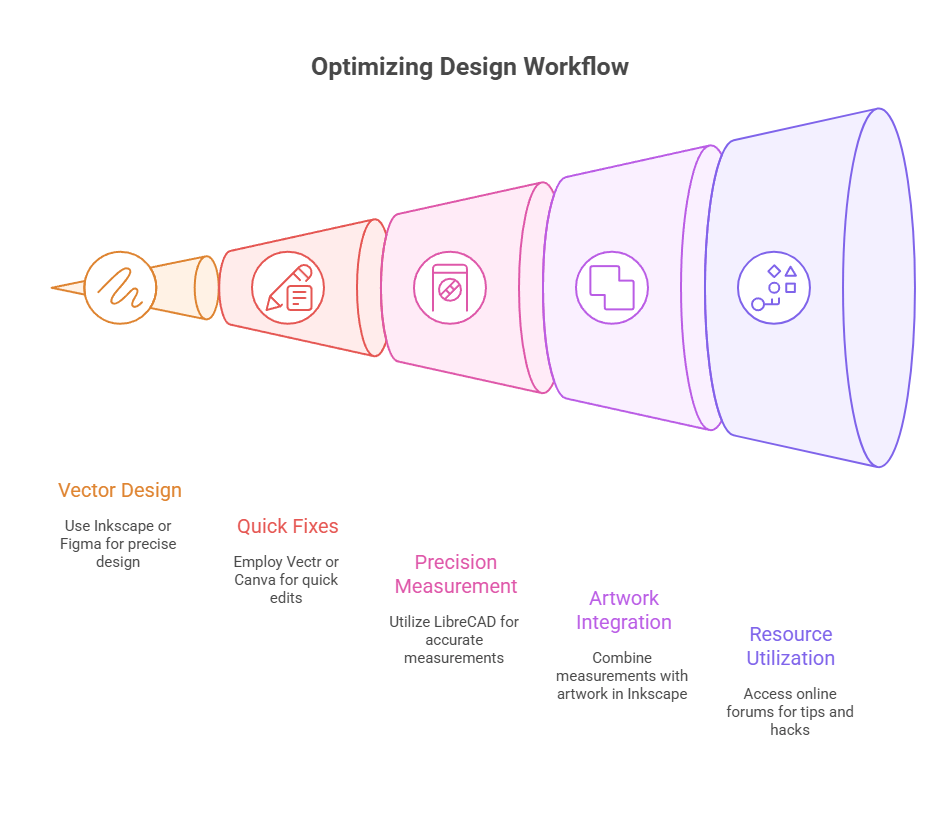Picture taking your own creative vision and transforming it into dazzling decals, complex signs, and personalized apparel without spending a fortune. Vinyl cutting has become the game-changer for DIY crafts and small business identity, putting it within reach of anyone with a cutter and some creativity. However, there’s the rub: your outcome largely relies on software.
Not all programs are equal, particularly when they’re free. The good news is that there are reliable, feature-packed free vinyl cutting software alternatives that can produce professional-quality outputs. This in-depth guide examines the top free vinyl cutting software, enabling you to compare their distinct features and select the ideal tool to elevate your craft or business to the next level.
Why Choosing Free Vinyl Cutting Software Matters
Before diving into some of the specific software tools out there, let’s discuss why finding trustworthy free tools is crucial to success in your projects.
Cost-Effective Yet Powerful Tools
Most of us believe free means limited, but the fact is that among the most stable software packages out there are free ones. Using these, you avoid high licensing fees, so your investment goes further—particularly crucial for hobbyists, start-ups, or experimenting with new ideas.
Open-Source Advantage
Open-source programs are usually privileged with active communities. This means periodic upgrades, custom plugins, and extensive guides—essential features that enable troubleshooting or upgrading functionality without incurring additional costs.
Compatibility and Flexibility
Quality free software usually complements standard formats like SVG, DXF, and AI, which enable effective communication with popular vinyl cutters such as Cricut, Silhouette, or Brother ScanNCut.
Building Your Skills
Free programs offer a low-risk environment to refine design skills, experiment with techniques, and discover what works best before investing in premium tools.

The Top Free Vinyl Cutting Software for Professional Results
Let’s explore the most reputable free vinyl cutting programs, analyze their features, and see why craft enthusiasts and small business owners swear by them.
1. Inkscape: The Artistic Powerhouse
Overview:
Inkscape is a free, open-source vector graphic editor renowned for its robustness. It holds its own against commercial software like Adobe Illustrator in terms of design capability, while natively handling SVG files.
Why it’s trusted:
- Robust vector editing for high-precision designs.
- Complex layering, masking, and path operations.
- This is a large community that provides tutorials, plugins, and extensions. (Wikipedia)
Use case for vinyl cutters:
You can create intricate graphics, logos, or intricate lettering with its very own tools. Export your creations in SVG format for simple import into cutters like Cricut Design Space or Silhouette Studio.
Expert tip:
Pair Inkscape with dedicated cutter software or plugins, such as ASVG Export, to streamline your workflow.
2. Sure Cuts A Lot (Free Version)
Overview:
While the full version of Sure Cuts A Lot (SCL) is a paid product, a free version is available with sufficient features to produce professional results for hobbyists and small operators.
Why it’s trusted:
- Tailored specifically for vinyl projects with a user-friendly interface.
- Supports a wide range of cutters, including Cricut, Silhouette, and Cameo.
- Text tools, shape design, and cut-line improvement.
Vinyl cutter use case:
Ideal for plain designs, text stickers, or simple shapes. The easy-to-use interface makes it easy for beginners to jump in without any inconvenience.
3. Silhouette Studio Basic (Free)
Overview:
Silhouette America developed this free version of Silhouette Studio, commonly used by Silhouette cutter users.
Why it’s trusted:
- Designed for Silhouette machines, but can also read SVG files.
- Access to fundamental design tools and ready-to-use templates.
- Updates and a massive user base.
Use case:
Suitable for crafting projects, personalized stickers, and decals with a low learning curve.
4. Cricut Design Space (Free)
Overview:
Cricut Design Space is the official software of Cricut machines. It is a cloud-based service with an enormous library of design assets.
Why it’s trusted:
- Entirely free to utilize with a Cricut cutter.
- A massive collection of free fonts and images is available.
- Seamless integration with Cricut hardware and mobile apps.
Use case:
Perfect for hobbyists, quick projects, and pre-designed templates, making it ideal for small-scale entrepreneurs.
5. LibreCAD: The Engineering-Grade Tool
Overview:
Though a 2D CAD software in nature, LibreCAD is invaluable for creating technical, precision-cut files.
Why it’s trusted:
- Very accurate and open-source.
- Can load DXF or other cutting-compliant formats.
- Ranges from exact measurements to more free-form features.
Use case:
Ideal for technical drawings, signage, or other projects where absolute dimensions are critical. If you’re creating industrial-style or extremely detailed architectural decals, LibreCAD provides the freedom you need to bring exquisite designs to life.
6. Figma (Free Plan)
Overview:
Figma is a web-based collaborative design platform primarily used for UI/UX. Still, vector tools are specifically ideal for designing SVG artwork, which is often employed in vinyl cuts.
Why it’s trusted:
- Cloud-based, hence accessible everywhere with internet access.
- Group projects become trouble-free because of real-time collaboration.
- Export in SVG to ensure compatibility with cutting software.
Use case:
Best suited for distributed teams or anyone who prefers a no-install, browser-based option for building complex graphics and prototypes.
7. Vectr: The Lean Solution
Overview:
Vectr is 7. Vectr: The Lean Solution
Overview:
Vectr is a simple vector graphic editor available as both a web application and desktop software.
Why it’s reliable:
- Simple-to-understand interface perfect for newcomers.
- SVG, PNG, and JPG exports are supported.
- No overly complex software knowledge needed.
Use case:
Great for creating quick designs, logos, and simple decals with a minimal learning curve.
8. Boxy SVG: The Web Design Specialist
Overview:
Even with numerous features similar to Adobe Illustrator, Boxy SVG offers an intuitive interface for editing SVG files online.
Why it’s trusted:
- Paid plans have access to advanced features; the free version is plenty for most vinyl projects.
- Easy import/export of SVG.
- Facilitates advanced path editing, gradients, and filters.
Use case:
Ideal for accurate logo creation and sophisticated designs calling for minute control over SVG properties.
9. Canva (Free & Paid Options)
Overview:
Although Canva is best known for creating marketing graphics and social media content, its free option offers a comprehensive array of tools for designing simple vinyl projects.
Why it’s relied upon:
- Drag-and-drop design that is perfect for beginners.
- Thousands of available templates and design assets are available.
- Export in SVG, PNG, or PDF formats for cutting and printing.
Use case:
Ideal for marketing stickers, simple decals, or quick personalized projects.
Comparing Free Vinyl Cutting Software: An Easy Reference
| Software | Best For | Key Strengths | Limitations |
| Inkscape | Detailed graphics & logos | Powerful vector editing, free, flexible | Slight learning curve, needs export/import setup |
| Sure Cuts A Lot | Beginners & quick projects | User-friendly, broad cutter support | Limited free features, best with the purchased version |
| Silhouette Studio Basic | Silhouette users | Easy, optimized for Silhouette cutters | Limited to Silhouette hardware, basic features |
| Cricut Design Space | Cricut owners | Extensive template library, cloud-based | Limited design tools in the free version |
| LibreCAD | Precision projects & signs | Accurate measurements, open source | Less artistic, mainly technical |
| Figma | Collaborative design | Cloud-based, supports SVG export | Requires internet, not necessarily for vinyl |
| Vectr | Quick, clean designs | Lightweight, simple to use | Simple features, few complex features |
| Boxy SVG | Logo creation & SVG editing | Feature-rich SVG, web-based | Paid plans are required for all features |
| Canva | Marketing decals & quick designs | Templates, simplicity, SVG export | Less control over exact vector editing |
Key Insights for Choosing the Best Free Software for Your Purposes
Even though every application has a niche, specific universal facts help limit your options:
- Design Complexity: For complicated logos or detailed artwork, Inkscape or Boxy SVG are optimal due to their advanced vector editing.
- Ease of Use: Beginners or those with high-turnaround projects are best suited for Canva, Vectr, or Silhouette Studio Basic.
- Precise Measurement Control: LibreCAD is unbeatable for projects requiring exact dimensions—essential for signage or industrial decals.
- Cloud-Based & Collaborative: Figma excels in collaboration, particularly for large projects or branding firms.
- Hardware Compatibility: Remember your own cutter—most free software exports SVG or DXF, which are well-supported by large cutters.
By comparing these attributes against one another, you can select software that fits your level of experience, project size, and hardware setup.

Workflow Tips: Combine Tools for Maximum Results
Alternating between software or blending the strengths of each can deliver maximum outcomes. Some approaches include:
- Vector Editor Design: Use Inkscape or Figma for precise design, then export SVG files for cutting and engraving.
- Use basic editors for quick fixes and simple shapes: Vectr or Canva are ideal for this step, particularly when time is of the essence.
- Use LibreCAD as a starting point for precision measurement projects, such as signage and layout planning. Then, export your artwork to Inkscape to incorporate it before shipping it to your cutter.
- Take advantage of online forums and tutorials specific to each program. Websites like YouTube, Reddit, and specific user groups usually have fantastically worthwhile workflow hacks, troubleshooting advice, and design concepts.

Utilize Automated Processes Whenever Possible
Some free tools, especially open-source applications like Inkscape, allow scripting and extensibility, making it easier to automate repetitive tasks, such as generating cutting lines or fill patterns. The use of these can really optimize efficiency.
Have a Clean File Pipeline
Establish an automated sequence by creating it in one program, exporting it, converting it if necessary, and then importing it into your cutting software. Having organized folders for your files facilitates easy debugging and revising.
Certainly! Here’s the continuation of your original essay with headings and formatting, keeping every word the same as you requested:
Common Issues and How Free Software Helps Overcome Them
Most novices are afraid of constraints with free software, but common problems are usually workable:
| Challenge | How Free Software Overcomes It | Tips |
| Limited design software | Use a few programs together, e.g., Inkscape + LibreCAD | Use each to its strengths, then combine files. |
| Cutter compatibility | Export as SVG or DXF, which most hardware can handle | Keep neat backups and version control. |
| Steep learning curve | Use free tutorials, forums, and community support | Spend time watching tutorial content. |
| File corruption or lost data | Keep neat backups and version control | Save incremental versions on large projects. |
Success Stories with Free Vinyl Cutting Software in Real-World Applications
Case #1: Small Business Branding
A small business owner used Inkscape to create logo decals, then sent out SVG files that could be cut on a Cricut machine—resulting in high-end, professional-looking branding stickers without any software costs, enabling swift product launches.
Case #2: Hobbyist Sign Maker
A hobbyist needing custom home signs employed LibreCAD for measurements and Inkscape for design detailing. Perfect alignment and fit were ensured by accurate measurements, with the artwork introducing an element of sophistication.
Case #3: Educational Workshop
An art teacher incorporated Canva and Vectr into assignments to encourage students’ creativity and digital literacy. The software was free, with the potential to enable students at various skill levels to produce designs that were exemplary for vinyl cutting.
Final Verdict: Trustworthy Free Vinyl Cutting Software Elevates Your Craft
With the no-cost options detailed here—Inkscape, Sure Cuts A Lot (free version), Silhouette Studio Basic, Cricut Design Space, LibreCAD, Figma, Vectr, Boxy SVG, and Canva—you’re equipped with powerful tools capable of producing professional vinyl projects.
Your choice hinges on your specific needs:
- For detailed, artistic graphics, go with Inkscape or Boxy SVG.
- For quick, easy projects, Vectr or Canva will be ideal.
- For precise measurement work, LibreCAD is an ideal choice.
- To ensure a smooth hardware flow, ensure your exported project is compatible with your cutter.
Remember: Mastering these free tools, their strengths, and how to utilize them in your workflow can save you thousands on software and still deliver outstanding results.
FAQ
What is the best free vinyl culling software for a beginner?
Vectr and Silhouette Studio Basic are the best options for beginners, as they feature simple-to-use interfaces and easy-to-use features, making them suitable for basic decals and crafts.
Can free software create professional-level designs?
Answer: Yes, indeed. Tools such as Inkscape and Boxy SVG provide professional-level vector editing features, and you can now create detailed, high-resolution artwork that’s appropriate for business-level vinyl work.
Do I need an internet connection to use cloud-based tools like Figma or Canva?
Answer: Yes, these tools are primarily web-based. Canva allows you to download your designs, enabling you to work offline. In contrast, Figma offers an offline mode, albeit with some restrictions.
Are there any limitations when using free vinyl cutting programs?
Answer: While full-featured, free programs do have limitations such as fewer options, limited support, or a learning curve. Accessing a range of programs and community support usually compensates for those deficiencies.
How do I choose the right software for my cutter?
Answer: Ensure your cutter-supported file types (e.g., SVG, DXF) and compatible software are installed. All free software programs support these, but check the documentation for your particular machine.
Take Your Vinyl Creations to New Heights
The appropriate free software has the power to unlock your creativity, maximize productivity, and achieve professional results—at no cost.
As an amateur, small enterprise, or instructor, these applications provide flexibility and capability to bring your vinyl projects to life with style and accuracy. Set yourself free, experiment with new applications, combine their power, and build a workflow tailored to your unique needs.
Keep in mind that having access to quality tools is merely the beginning. Your creativity, attention to detail, and dedication will be what make your final product truly shine. Don’t let financial concerns hold you back—these free tools are more than capable of helping you produce professional-grade decals, signs, and apparel.

Leave a Reply
You must be logged in to post a comment.